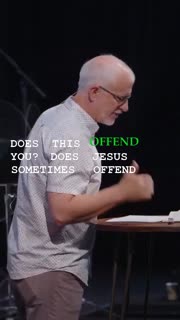Jesus: The Bread of Life and Spiritual Nourishment
Devotional
Sermon Summary
Bible Study Guide
Sermon Clips
### Quotes for Outreach
1. "Jesus is coming along and in this teaching as I said he's fed the 5,000 he's walked on the water he comes out and he starts talking about this bread of life thing and people are kind of wondering what is it that he's actually talking about and what's the matter with God I don't understand this you know and he's there firing questions at him and then he makes the statement he says well the work of God is this the work of God is this you need to believe in the one when he is sent and if speaking of himself there you need to believe in the one that he is sent." [35:30] (32 seconds)
2. "Jesus is doing what Jesus does. He's taking something in our everyday life and he's drawing it and showing it and painting a better picture. So he's doing this and he's talking, listen, this is going to satisfy your soul and now I'm not going to, you know, necessarily going to do another sign. I mean, we know that Jesus goes on to do some other things and all that kind of stuff. But he's talking, I am the bread of life. I want to bring hope. I want to bring life to you." [38:16] (24 seconds)
3. "The spirit gives life. The flesh counts for nothing. The words I've spoken to you, they are full of spirit and life. Let's just pause for a moment. This right here helps us to understand Jesus isn't talking about some sort of cannibalism. He's not talking about anything like that. He's not talking about actually eating his flesh or drinking his blood. These things have a spiritual component to it, a depth to it, far beyond just a great meal, far beyond that, something to truly satisfy our souls." [42:53] (36 seconds)
4. "The spirit, gives life. Remind ourselves, what is the work of God? The work of God is this, that we would believe in the one whom he has sent. That we would believe and trust in Jesus Christ. Not to chase after the things of this life solely as if to gain some form of esteem or value or identity or purpose from them. Mark, in his gospel, wrote this and he says, listen, it's possible to gain the whole world and yet forfeit and lose your soul." [46:25] (32 seconds)
5. "Jesus brings new purpose. He brings new value. He brings a new lens in how to see life and how to experience it. Followers and disciples of Jesus are one who do the work of God. And they believe in the one whom he has sent. These men and women who are following Jesus, as you read, as you heard, some were falling away. Some were leaving. They were being confused by the teaching. They were concerned. They were challenged. They were feeling offended by it. They were falling away. They pushed back. They grumbled. They muttered, we follow Abraham." [49:58] (54 seconds)
### Quotes for Members
1. "Does this offend you? Does Jesus sometimes offend you? Like, does sometimes when you're reading, you just kind of go, yeah, no, not interested. Flip the page. I've got to go back to my favorite one. God so loved me. And he does. And that's why sometimes he has to kind of gently poke us a little bit. Try to get our attention. Be careful. Watch where you're going. Watch which direction. Watch where you're placing your values. Watch where you're putting all your energy and your mind and your thinking and your, and what your purpose is." [51:52] (46 seconds)
2. "Can God still get your attention? I mean, as the author of life, can God still get your attention today? He has come to offer us life. The spirit offers. He offers us life. Jesus is the bread of life. He comes to offer it to us today. In him, we have life and light. And Jesus asks that second question. You don't want to leave too, do you? And he knew, he knew the answer to the question. The way it's written in the original language, it indicates that it's not that he was really afraid that these were going to be leaving. But he was just like, you get what I'm saying, right? You guys understand?" [59:19] (54 seconds)
3. "Listen, leaving can sometimes even happen being here, which is weird. Those people were there. They were following him. And yet they were starting to leave, even though they were still following. They were starting to leave. They weren't believing anymore. It just becomes sort of rote memory, just duty. They've lost the life that the Spirit wants to come and offer to you. And to me, taste and see, Psalm 34, 8. Taste and see and know that the Lord is good." [01:01:12] (40 seconds)
4. "He says to us, my life for your life. He says, my peace for your anger. My peace for your bitterness. He comes and he offers us his grace for our shame. Those things that you really can't even forgive yourself for. He offers us his grace and his mercy. He says, my love. My love and my hope for your fear. I don't know what fears overtake you in the middle of the night. But he offers us his love. He offers us his hope. He offers us his presence for the unknown." [01:03:41] (54 seconds)
5. "Jesus died and was raised that we can truly follow him in all of life for all of life. That's the gift. That's the blessing. That's the opportunity. I'm going to pray. And then when you're ready, you feel free to take that. And then Jake, you'd lead on. God, thank you so much. Jesus, thank you so much. Holy Spirit for your presence here today. We, I pray, I claim, I ask that we might discover the life that Jesus was speaking about here. That we would discover what it is to have you meet us and truly satisfy our souls." [01:06:36] (36 seconds)
Ask a question about this sermon
1. "Jesus is coming along and in this teaching as I said he's fed the 5,000 he's walked on the water he comes out and he starts talking about this bread of life thing and people are kind of wondering what is it that he's actually talking about and what's the matter with God I don't understand this you know and he's there firing questions at him and then he makes the statement he says well the work of God is this the work of God is this you need to believe in the one when he is sent and if speaking of himself there you need to believe in the one that he is sent." [35:30] (32 seconds)
2. "Jesus is doing what Jesus does. He's taking something in our everyday life and he's drawing it and showing it and painting a better picture. So he's doing this and he's talking, listen, this is going to satisfy your soul and now I'm not going to, you know, necessarily going to do another sign. I mean, we know that Jesus goes on to do some other things and all that kind of stuff. But he's talking, I am the bread of life. I want to bring hope. I want to bring life to you." [38:16] (24 seconds)
3. "The spirit gives life. The flesh counts for nothing. The words I've spoken to you, they are full of spirit and life. Let's just pause for a moment. This right here helps us to understand Jesus isn't talking about some sort of cannibalism. He's not talking about anything like that. He's not talking about actually eating his flesh or drinking his blood. These things have a spiritual component to it, a depth to it, far beyond just a great meal, far beyond that, something to truly satisfy our souls." [42:53] (36 seconds)
4. "The spirit, gives life. Remind ourselves, what is the work of God? The work of God is this, that we would believe in the one whom he has sent. That we would believe and trust in Jesus Christ. Not to chase after the things of this life solely as if to gain some form of esteem or value or identity or purpose from them. Mark, in his gospel, wrote this and he says, listen, it's possible to gain the whole world and yet forfeit and lose your soul." [46:25] (32 seconds)
5. "Jesus brings new purpose. He brings new value. He brings a new lens in how to see life and how to experience it. Followers and disciples of Jesus are one who do the work of God. And they believe in the one whom he has sent. These men and women who are following Jesus, as you read, as you heard, some were falling away. Some were leaving. They were being confused by the teaching. They were concerned. They were challenged. They were feeling offended by it. They were falling away. They pushed back. They grumbled. They muttered, we follow Abraham." [49:58] (54 seconds)
### Quotes for Members
1. "Does this offend you? Does Jesus sometimes offend you? Like, does sometimes when you're reading, you just kind of go, yeah, no, not interested. Flip the page. I've got to go back to my favorite one. God so loved me. And he does. And that's why sometimes he has to kind of gently poke us a little bit. Try to get our attention. Be careful. Watch where you're going. Watch which direction. Watch where you're placing your values. Watch where you're putting all your energy and your mind and your thinking and your, and what your purpose is." [51:52] (46 seconds)
2. "Can God still get your attention? I mean, as the author of life, can God still get your attention today? He has come to offer us life. The spirit offers. He offers us life. Jesus is the bread of life. He comes to offer it to us today. In him, we have life and light. And Jesus asks that second question. You don't want to leave too, do you? And he knew, he knew the answer to the question. The way it's written in the original language, it indicates that it's not that he was really afraid that these were going to be leaving. But he was just like, you get what I'm saying, right? You guys understand?" [59:19] (54 seconds)
3. "Listen, leaving can sometimes even happen being here, which is weird. Those people were there. They were following him. And yet they were starting to leave, even though they were still following. They were starting to leave. They weren't believing anymore. It just becomes sort of rote memory, just duty. They've lost the life that the Spirit wants to come and offer to you. And to me, taste and see, Psalm 34, 8. Taste and see and know that the Lord is good." [01:01:12] (40 seconds)
4. "He says to us, my life for your life. He says, my peace for your anger. My peace for your bitterness. He comes and he offers us his grace for our shame. Those things that you really can't even forgive yourself for. He offers us his grace and his mercy. He says, my love. My love and my hope for your fear. I don't know what fears overtake you in the middle of the night. But he offers us his love. He offers us his hope. He offers us his presence for the unknown." [01:03:41] (54 seconds)
5. "Jesus died and was raised that we can truly follow him in all of life for all of life. That's the gift. That's the blessing. That's the opportunity. I'm going to pray. And then when you're ready, you feel free to take that. And then Jake, you'd lead on. God, thank you so much. Jesus, thank you so much. Holy Spirit for your presence here today. We, I pray, I claim, I ask that we might discover the life that Jesus was speaking about here. That we would discover what it is to have you meet us and truly satisfy our souls." [01:06:36] (36 seconds)










